Speakers
Dear ISINP-2025 Speakers,
You may have received an email offering to arrange hotel reservations for ISINP-2025 in Como.
This is spam — please disregard this email and do not respond! Do not provide any information, including arrival and departure times!
If you have any questions regarding options for accommodation and hotel booking please contact Mariagiovanna Falasconi (mariagiovanna.falasconi@fondazionealessandrovolta.it)
With best wishes and we look forward to welcoming you in Como!
Mariagiovanna Falasconi
Alberto Marzorati
Yaopeng Ma
.

Krasimira Tsaneva-Atanasova
Professor Krasimira Tsaneva-Atanasova is Vice-President and Deputy Vice-Chancellor for Research and Impact and Professor of Mathematics for Healthcare. She is an internationally recognised expert in mathematical modelling, data analysis and applications of dynamical systems theory to addressingss biomedical and health challenges. As Vice-President and Deputy Vice-Chancellor (Research and Impact), Professor Tsaneva-Atanasova oversees a total research portfolio of over £500 million and leads the research and impact strategy for the University. Her overarching responsibilities include our preparation and submission for the Research Excellence Framework in 2029; interdisciplinary institutes, networks and centres; strategic leadership of our Doctoral College, the University Ethics Committee and the Research and Impact Executive Committee; and ensuring our research is utilised and impacts positively on the wider world. Professor Tsaneva-Atanasova represents the University externally via a number of research-related groups including GW4, our regional alliance of the Universities of Bristol, Bath, Cardiff and Exeter, and as Chair of the UUKi Global Research and Innovation Network (GRIN) (2024 – 2025). Currently she also serves as a member of the BBSRC Commitee E, the UKRI Talent Panel College and the EPSRC Peer Review College. Among other positions, she is Director of the EPSRC Hub for Quantitative Modelling in Healthcare, an associate member (since February 2020) of the Bulgarian Academy of Sciences, Institute of Biophysics and Biomedical Engineering, Bioinformatics and Mathematical Modelling and a Fellow of the Institute of Mathematics and its Applications (since April 2020). She held a Hans Fischer Senior Fellowship at the Technical University of Munich, Institute for Advanced Study (2019-2023). Professor Tsaneva-Atanasova’s research addresses open questions in Health and Life Sciences by means of mathematical modelling and analysis including advanced data analytics. The ultimate goal is to be able to propose novel applications of mathematics to enable the development of quantitative methods for healthcare and healthcare technologies. She is an expert in data-informed biophysical modelling with particular focus on biomedical and healthcare applications. She has a long-standing interest in developing patient-specific (personalised) computational approaches to complex disease prognosis and progression to inform clinical decision making. This is reflected in her experience in modelling neuroendocrine, neuropsychiatric, and chronic respiratory disorders.
.

Natàlia Balagué
Professor of Exercise Physiology at INEFC (University of Barcelona) and coordinator of the Complex Systems and Sport Research Group. She participates in education programs addressed to professional soccer coaches under the auspices of Football Club Barcelona and the Spanish Soccer Federation. Her research applies complex systems tools to biobehavioural sciences with particular focus on sport related phenomena. Her main aim is to understand the general principles of adaptive behavioral and experiential dynamics of human beings. She has published numerous works and is co-author of the first books applying complex systems science to sport. She founded the international conference Complex Systems in Sport, has been member of the scientific committee of the European College of Sport Science and is Editor-in-chief of Frontiers in Network Physiology of Exercise.
.
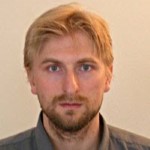
Ronny P. Bartsch
Dr. Bartsch studied physics in Konstanz, Germany where he received a M.Sc. degree in theoretical physics in July 2003, and at Bar-llan University, Israel where he received his PhD in June 2009. He was a post-doctoral fellow at the Division of Sleep Medicine, Harvard Medical School from 2008 till 2012, after which he joined the faculty at the same division as an Instructor in Medicine. In April 2014, Dr. Bartsch joined the Physics Department at Boston University as a Research Assistant Professor, Currently he is a Senior Lecturer at the Physics Department, Bar-Ilan University. Dr. Bartsch applies methods from statistical and computational physics and nonlinear dynamics to study physiologic systems, sleep regulation, circadian rhythms, and how physiologic transitions affect coupling between organ systems. He is recipient of the prestigious German DAAD Fellowship for the period 2010-2012. In 2012 he was awarded the Young Investigator of the Year Prize by the German Society of Sleep Medicine, and in 2014 he won a “Marie Curie” fellowship from the European Commission.
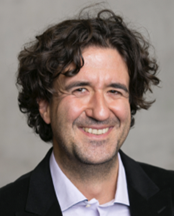
Thomas Beyer
Thomas Beyer holds a PhD in Physics and is co-developer of combined PET/CT imaging systems. He has a background in research and project management in academia and imaging industry. Thomas graduated in Physics from the Leipzig University (Germany) and got his PhD in Medical Physics from Surrey University (UK). During his US-based studies he became involved in the development and clinical testing of the first PET/CT prototype (1992-2000) before joining Siemens/CTI PET Systems as an International PET/CT specialist. In 2002 he became a Research Associate in Nuclear Medicine and Radiology and PET/CT project manager at Essen University Hospital (Germany). In 2006 he became Teaching Professor (Priv.-Doz.) for Experimental Nuclear Medicine at Essen, and joined timaq medical imaging Inc, a Zurich-based Imaging CRO. In 2007 Thomas moved to Philips Medical Systems as International Manager Clinical Science Nuclear Medicine. In 2008 he set up a Zurich-based consulting company for expert advise in cross-modality imaging and applications. He was appointed full professor of Physics of Medical Imaging at the Medical University of Vienna in March 2013. Since then, he has co-founded two University spin-offs and proliferated collaborative research in whole-body and total-body PET/CT imaging with a focus on multi-organ interactions in health and disease. Thomas is a member of various national and international Medicine organizations, a founding member of the European Association of Nuclear Medicine (EANM) Physics Committee, the European Society of Hybrid Imaging and past Head of the New Technology working group at the Association of Imaging Producers and Equipment Suppliers (AIPES).
.
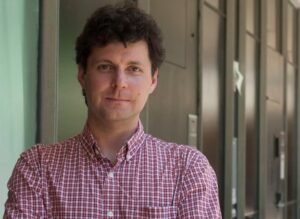
Paul Bogdan
Paul Bogdan is the Jack Munushian Early Career Chair and Associate Professor in the Ming Hsieh Department of Electrical and Computer Engineering at University of Southern California. He received his Ph.D. degree in Electrical & Computer Engineering at Carnegie Mellon University. His work has been recognized with a number of honors and distinctions, including the 2021 DoD Trusted Artificial Intelligence (TAI) Challenge award, the USC Stevens Center 2021 Technology Advancement Award for the first AI framework for SARS-CoV-2 vaccine design, the 2019 Defense Advanced Research Projects Agency (DARPA) Director’s Fellowship award, the 2018 IEEE CEDA Ernest S. Kuh Early Career Award, the 2017 DARPA Young Faculty Award, the 2017 Okawa Foundation Award, the 2015 National Science Foundation (NSF) CAREER award, the 2012 A.G. Jordan Award from Carnegie Mellon University for an outstanding Ph.D. thesis and service, and several best paper awards. His research interests include cyber-physical systems, computational cognitive neuroscience tools for deciphering biological intelligence, network physiology, quantification of the degree of trustworthiness and self-optimization of AI systems, machine learning techniques for complex multimodal data, control of complex time-varying networks, modeling and analysis of biological systems and swarms, control of multi-fractal characteristics, performance analysis and design methodologies for heterogeneous manycore systems.
.

Luca Faes
Luca Faes is Professor of Biomedical Engineering at the University of Palermo, Italy. He obtained his MS and PhD in Electronic Engineering at the University of Padova (1998) and at the University of Trento (2003), Italy, respectively. He was with the Dept. of Physics (2004-2013) and the BIOtech Center (2008-2013) of the University of Trento, and with the Bruno Kessler Foundation (FBK, Trento, 2013-2017). He has been visiting scientist at the State University of New York (2007), Worcester Polytechnic Institute (MA, USA, 2010), University of Gent (Belgium, 2013), University of Minas Gerais (Brazil, 2015), and Boston University (MA, USA, 2016). He is Senior Member of the IEEE, and member of the IEEE Engineering in Medicine and Biology Society (IEEE-EMBS), for which he serves in the Technical Committee of Biomedical Signal Processing and regularly organizes symposia and invited sessions at the Annual EMBC Conference. He is member of the European Study Group on Cardiovascular Oscillations (ESGCO), and was organizer and Program Chair of the 8th ESGCO conference (Trento, Italy, 2014). He is Specialty Chief Editor of the Section “Information Theory” of Frontiers in Network Physiology, and serves as editor at several peer-review journals, including Entropy, Frontiers in Physiology, and Computational and Mathematical Methods in Medicine. His teaching activity includes Biosensors, Biomedical Devices and Statistical Analysis of Biomedical Signals: His research activity is focused on the development of methods for multivariate time series analysis and system modeling, with applications to cardiovascular neuroscience, cardiac arrhythmias, brain connectivity and network physiology. Within these fields, he has authored eight book chapters and more than 200 peer-reviewed publications, receiving more than 5700 citations (h-index: 50; font: Scholar).
.
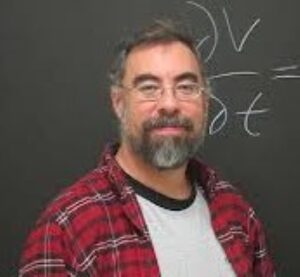
Flavio H. Fenton
Flavio H. Fenton is a Professor in the School of Physics at Georgia Tech, specializing in nonlinear dynamics and chaos, with focus on their applications to biological and physiological systems. He is deeply involved in computational physics and high-performance computing. His research uses an equally combined approach of theoretical work, experiments, and computer simulations involving network-based approaches. Dr. Fenton has been recognized as a Fellow of the American Physical Society for his groundbreaking contributions to the understanding of the nonlinear dynamics of cardiac arrhythmias. He has also received the prestigious Douglas P. Zipes Lectureship Award from the Heart Rhythm Society. Dr. Fenton’s work has been supported by grants from the National Science Foundation (NSF), National Institutes of Health (NIH), and the American Heart Association (AHA). In addition to his research, Dr. Fenton is passionate about teaching and outreach. He has designed and delivered numerous graduate and undergraduate workshops and has received several teaching awards.
.
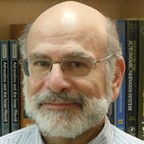
David S. Goldstein
Dr. Goldstein graduated from Yale College and received an M.D.-Ph.D. in Behavioral Sciences from Johns Hopkins. After medical internship and residency at the University of Washington, he came to the NIH as a Clinical Associate in the NHLBI, obtaining tenure as a Senior Investigator in 1984. He joined the NINDS in 1990 to head the Clinical Neurochemistry Section and founded and has directed the Clinical Neurocardiology Section (name changed to Autonomic Medicine Section in 2019). He has received Yale’s Angier Prize for Research in Psychology, the Laufberger Medal of the Czech Academy of Sciences, 2 NIH Merit Awards, the Founders Award of the Bakken Heart-Brain Institute, the Distinguished Investigator Award of the Society for Clinical and Translational Science, and the NIH Distinguished Clinical Teacher Award. He is author of more than 600 research articles and several books, including “Adrenaline and the Inner World: An Introduction to Scientific Integrative Medicine,” “Dysautonomias: A Handbook for Patients,” “Stress, Catecholamines, and Cardiovascular Disease,” “The Autonomic Nervous System in Health and Disease,” and the e-book, “Principles of Autonomic Medicine.” Dr. Goldstein also directs the UCNS-accredited Clinical Fellowship in Autonomic Disorders at the NIH Clinical Center.
.
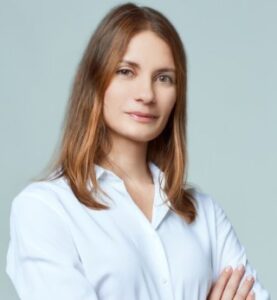
Susanna Gordleeva
Susanna Gordleeva received the M.Sc. and Ph.D. degrees in physics and mathematics from the Lobachevsky State University of Nizhny Novgorod, Nizhny Novgorod, Russia, in 2010 and 2015, respectively, and the D.Sc. (Habilitation) degree in biophysics from the Institute of Theoretical and Experimental Biophysics RAS, Pushchino, Russia, in 2022. Since 2015, she has been serving as an Assistant Professor in computational neuroscience at Lobachevsky State University, Nizhny Novgorod. In 2021, she became the Head of the Laboratory of Neurodynamics and Cognitive Technologies, Institute of Neuroscience, Lobachevsky State University. In 2022, she was appointed as a Professor in computational neuroscience. She is currently a Professor at the Department of Neurotechnologies and Director of the Neuroscience Research Institute at the Lobachevsky State University. Her research interests encompass theoretical neuroscience, computational neurobiology, neurotechnology, and mathematical biology. In 2023, she received the Russian Presidential Prize for Young Scientists in the field of Science and Innovation for her development of neuromorphic AI technologies.
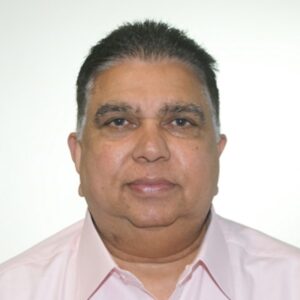
Nandu Goswami
Dr Goswami is a medical doctor, with a PhD in cardiovascular/integrative Physiology. Dr Goswami’s special research interests are in the field of cardiovascular regulation, cerebral blood flow, orthostatic intolerance and the effects of bedrest induced deconditioning. As orthostatic intolerance is a clinical problem as well as a major problem in spaceflight, Dr Goswami combines clinical research related to syncope, autonomic function and falls with spaceflight research. He has extensive experience in the usage of lower body negative pressure (LBNP). His expertise also includes vascular function assessments in health and disease. He is professor of Physiology and the co-director of the Center for Space and Aviation Health at the Mohammed Bin Rashid University of Medicine (MBRU) at Dubai, Dubai Health, and is also the head of the research unit “Gravitational Physiology and Medicine” at the Medical University of Graz, Austria. He has published over 160 papers in the field of cardiovascular system and vascular function assessments in health and diseases. Dr Goswami is a PI on several Mohammed Bin Rashid Space Center (MBRSC) and European Space Agency (ESA) approved projects. Dr Goswami is a member of the ESA bedrest scientific committee, a full member of the international Academy of Astronautics (IAA) and immediate past-president of the Austrian Physiological Society.
 Sallie Gregson
Sallie Gregson
Sallie Gregson is the Journal Manager for Frontiers in Network Physiology, the only scientific journal dedicated to the field. Sallie has over 10 years experience in managing journals and supporting researchers to publish their work. At Frontiers she is responsible for the development of Frontiers in Network Physiology, which was only launched in 2021 and has already been indexed by Web of Science, Scopus, and PubMed Central. Frontiers is a leading research publisher, Frontiers journals provide a trusted open access platform for well-established and emerging research communities. Directed by experienced chief editors, they ensure a continuous stream of high quality, openly available research in their field.
.

Shlomo Havlin
Professor Shlomo Havlin made fundamental contributions to the physics of complex systems and statistical physics. These discoveries have impacted many other fields such as medicine, biology, geophysics, and more. He has over 70,000 citations on ISI Web of Science and over 120,000 in Google Scholar. His h-index is 118 (151) in Web of Science (Google Scholar). Havlin has been a Highly Cited Scientist in the last 3 years. He is a professor in the Physics Department at Bar-llan University. He received his Ph.D. in 1972 from Bar llan University and he has been a professor at BIU since 1984. Also, between the years of 1999 – 2001 he was the Dean of the Faculty of Exact Sciences and from 1996 to 1999 he was the President of the Israel Physical Society. Havlin won the Israel Prize in Physics (2018), Order of the Star of Italy, President of Italy (2017), the Rothschild Prize for Physical and Chemical Sciences, Israel (2014), the Lilienfeld Prize for “a most outstanding contribution to physics”, APS, USA (2010), the Humboldt Senior Award, Germany (2006), the Distinguished Scientist Award, Chinese Academy of Sciences (2017), the Weizmann Prize for Exact Sciences, Israel (2009), the Nicholson Medal, American Physical Society, USA (2006) and many others. His main research interests are in the fields of statistical physics and complex networks, with a focus on interdependent networks, cascading failures, networks of networks and their implications to real world problems. The real-world systems he studied include physiology, climate, infrastructures, finance, traffic, earthquakes and others.
.
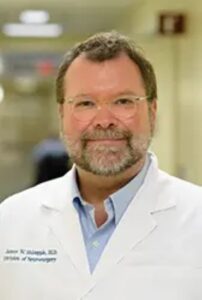
James W. Holsapple
James Holsapple is the Chair of the Department of Neurological Surgery at Boston University School of Medicine and Chief of Neurological Surgery at Boston Medical Center. He is a graduate of the University of Kansas School of Medicine. Dr. Holsapple completed residency training in neurological surgery at SUNY Syracuse where he also served as an intern in general surgery and participated in a NRSA research training fellowship in neuroscience. His research interests include primate motor system anatomy, non-vesicular mechanisms of synaptic acetylcholine storage and secretion, scaling effects of visual stimuli in primate V1, and most recently cerebral blood flow autoregulation and development of non-invasive measurements of intracranial pressure, blood flow, and compliance. Dr. Holsapple is the residency program director for the Beth Israel Deaconess Medical Center/Boston Medical Center training program in neurological surgery. He also serves as the program director of the undergraduate summer program in neuroscience (SPIN) at Boston University School of Medicine.
.
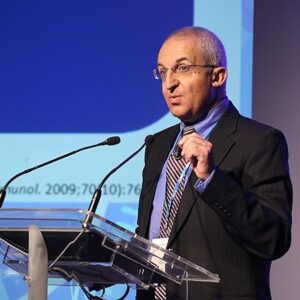
Yaron Ilan
Dr. Yaron Ilan is a Professor of Medicine at the Faculty of Medicine of the Hebrew University and the Chairman of the Department of Medicine at the Hadassah Medical Center in Jerusalem. Dr. Ilan served as the Vice Dean of the Hebrew University-Hadassah Medical School. Dr. Ilan was a Visiting Professor at Harvard University, focusing on innovative oral immunotherapies and the relationship between the brain and gut. Dr. Ilan’s primary research areas include the development of artificial intelligence-based algorithms for healthcare, immunomodulatory therapies for fatty liver disease, diabetes, and inflammatory bowel diseases, as well as drugs targeting primary liver cancer. He holds over 50 patents for innovative discoveries and has authored over 350 peer-reviewed articles and two books. His book, “Improve with Noise,” has achieved bestseller status on Amazon. Dr. Ilan is the inventor of various drugs, medical devices, and AI-based algorithms developed in collaboration with several pharmaceutical companies. Many of his innovations have successfully reached the clinical market. He is also the founder of several companies and serves as a medical director and advisor for various biotech firms. Dr. Ilan’s research in network physiology focuses on using biological noise to improve the effectiveness and functionality of complex systems. He has developed the concept of constrained disorder, which characterizes complex systems by their inherent variability. This variability is limited by dynamic boundaries that help regulate the noise range for optimal adaptation to internal and external disturbances. This work created the Constrained Disorder Principle and a second-generation artificial intelligence platform. Algorithms based on this principle integrate physiological and pathological variability patterns into therapeutic regimens to address system malfunctions. This platform helps patients overcome the unresponsiveness of target organs to treatments by utilizing artificial intelligence processes that take advantage of biological noise.
.
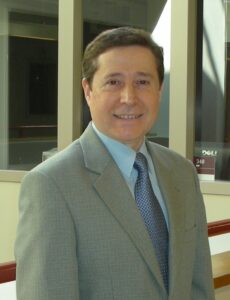
Plamen Ch. Ivanov
Professor Ivanov, PhD, DSc, is Director of the Keck Laboratory for Network Physiology at Boston University, and Associate Physiologist at the Division of Sleep Medicine, Brigham and Women’s Hospital, Harvard Medical School. He has introduced innovative ways of analyzing and modeling physiologic systems, adapting and developing concepts and methods from modern statistical physics and nonlinear dynamics. He has investigated the complex dynamics and underlying control mechanisms of a range of physiological systems, including studies on cardiac and respiratory dynamics, sleep-stage transitions, circadian rhythms, locomotion and brain dynamics, and has uncovered basic laws of physiologic regulation. He is the originator and founder of the new emerging field of Network Physiology, to address the fundamental question of how diverse organ systems and sub-systems in the human body interact as a network and continuously coordinate, synchronize and integrate their functions to produce health and disease. Dr. Ivanov is one of the nine founding members of PhysioNet, an NIH sponsored data sharing research resource. His research has been funded by the W. M. Keck Foundation, NIH, Office of Naval Research (ONR) and the US-Israel Binational Science Foundation (BSF). For his achievements, Dr. Ivanov was elected Fellow of the American Physical Society in 2010. He is recipient of the Sustained Research Excellence Award (2009-2011) of the Biomedical Research Institute, Brigham and Women’s Hospital, Harvard Medical School; of the Georgi Nadjakov Medal, Bulgarian Academy of Sciences (2012), and of the Pythagoras Award for significant achievements in interdisciplinary research (2014). He served on several Editorial and Advisory Boards, including EPL (Europhysics Letters), EPJ Nonlinear Biomedical Physics, Journal of Biological Physics (JOBP), Frontiers in Fractal Physiology, Physiological Measurement. Professor Ivanov is the Field Chief Editor of the journal Frontiers in Network Physiology. He is the founding Director of the International Summer Institute on Network Physiology (ISINP), Lake Como School of Advanced Study.
Keck Lab Network Physiology website: https://sites.google.com/site/labnetworkphysiology/home
.

Viktor Jirsa
Viktor Jirsa is Director of Research at the Centre National de la Recherche Scientifique (CNRS) in France. He serves as Director of the Inserm Institut de Neurosciences des Systèmes (UMR1106 Inserm) at Aix-Marseille University and Chief Science Officer of the federated European digital neuroscience infrastructure EBRAINS (https://ebrains.eu). 1999 to 2005 he served as faculty member at the Center for Complex Systems and Brain Sciences, as well as the Physics Department of Florida Atlantic University. He joined the CNRS in Marseille, France in 2006 and co-founded the Institut de Neurosciences des Systèmes (INS), UMR1106 Inserm, Aix-Marseille University in 2012. Today INS is a research institute comprising 150 researchers and faculty of various disciplines including theoretical, cognitive and clinical neurosciences. INS is recognized as one of the leading centers in digital health in France. Since the late 90s Dr. Jirsa has made pioneering contributions to the understanding of how network structure constrains the emergence of brain activity using methods from nonlinear dynamic system theory and computational neuroscience. He leads the neuroinformatics platform The Virtual Brain (www.thevirtualbrain.org) with a focus on applications of digital twins in personalized medicine. He is Scientific Director of the French large-scale multi-site clinical trial EPINOV testing Virtual Brain technologies in Epilepsy surgery with 400 prospective patients. Dr. Jirsa has been awarded several international and national awards for his research including the Early Career Distinguished Scholar Award (NASPSPA, 2004), the Francois Erbsmann Prize in 2001, the first HBP Innovation prize (2021) and Grand Prix de Recherche en Provence (2018). He is invited regularly to major international conferences and has given more than 200 invited lectures, including various keynote addresses and plenary lectures. Dr. Jirsa serves on multiple Editorial and Scientific Advisory Boards and has published more than 200 scientific articles and book chapters with more than 20,000 citations, as well as co-edited several books including the Handbook of Brain Connectivity.
.
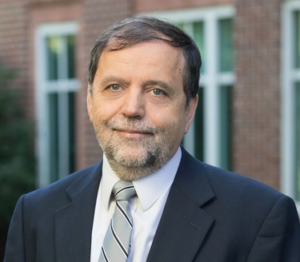
Boris P. Kovatchev
Boris Kovatchev, Ph.D. is the Madge M Jones Professor of Diabetes at the University of Virginia School of Medicine, Adjunct Professor at the School of Data Science, and the founding Director of the UVA Center for Diabetes Technology. Kovatchev has 32-year track record in data analysis, modeling, biosimulation, and algorithm development. He is Principal Investigator of several projects dedicated to diabetes data science and the development of automated insulin delivery (AID) systems, known as the “artificial pancreas.” His research team has been involved in the AID field, since its beginning back in 2005. In 2008, Kovatchev and colleagues introduced the first (and so far only) simulator of the human metabolic system accepted by the FDA as a substitute to animal trials. Since then AID algorithms are being developed and evaluated fast and cost effectively in silico – animal trials have been abandoned – and this accelerated the development of AID by years. In 2011, his team introduced the first wearable AID system – UVA’s DiAs (Diabetes Assistant) – which enabled the earliest outpatient AID trials in the U.S. and Europe. During 2016-2020, Kovatchev led the multi-center NIH/NIDDK International Diabetes Closed-Loop (iDCL) Trial. This study resulted in the FDA approval for clinical use of a new AID system – Control-IQ (Tandem Diabetes Care) – which is based on a control algorithm developed at UVA. Control-IQ is now used by nearly 500,000 people with type 1 diabetes in the U.S. and 25 other countries. Today, AID is the standard of care for type 1 diabetes. Each AID user collects a data vector every 5 minutes, for life, rapidly turning the treatment of diabetes into a Data Science problem. As a result, in 2024, Kovatchev’s team introduced a new class of AID algorithms – a Neural-Net Artificial Pancreas that is entirely based on data-driven machine learning methods, instead of traditional differential-equation models. The Neural-Net Artificial Pancreas became the first “black box” insulin controller approved by the FDA to automatically regulate in real time the blood sugar levels of people with diabetes. To date, two clinical trials confirmed its effectiveness, opening the AID field to new Artificial Intelligence applications. Kovatchev is author of over 240 peer-reviewed publications cited 37,000 times and holds over 40 U.S. and international patents. For his translational work, he was named the University of Virginia’s Edlich-Henderson Inventor of the Year, and was elected Fellow of the U.S. National Academy of Inventors.
.
.
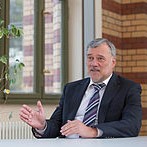
Jürgen Kurths
Jürgen Kurths is a mathematician and a physicist. He received the Ph.D.degree from the GDR Academy of Sciences and his Dr. habil. from the university of Rostock.. He was a Full Professor with the University of Potsdam, from 1994 to 2008. He has been a Professor of Nonlinear Dynamics at the Humboldt University, Berlin, and the Chair of the Research Domain Complexity Science of the Potsdam Institute for Climate Impact Research, since 2008. He is a Fellow of the American Physical Society, of the Royal Society of Edinburgh and of the Network Science Society and a member of the Academia Europaea. He received an Alexander von Humboldt Research Award in 2005 and 2021, the Richardson award from the European Geoscience Union in 2013, the Lagrange Award in 2022, and the SigmaPhi Prize of the European Physical Society in 2023 (together with Nobel Prize winner Michael Kosterlitz). He is Chapman Chair of the university of Fairbanks and Distinguished Adjunct Professor at KENTECH (Korea). He was the German Speaker of the International Research and Training Group (IRTG 1740): Dynamical and Transport Phenomena on Complex Networks (Germany and Brazil, DFG&FAPESP), is a highly-cited researcher (Clarivate) since 2017 without interruptions and got eight Honorary Doctorates and Honorary Professorships. He is Editor-in-chief of CHAOS – A Journal of Nonlinear Science and editor of further journals. The primary research interests of Jürgen Kurths include complex systems science, in particular synchronization, complex networks, extreme events and time series analysis and its applications in Earth Sciences, Physiology, engineering and others.
.
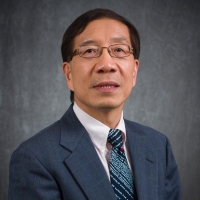
Ying-Cheng Lai
Ying-Cheng Lai is a Regents Professor (the highest possible faculty award in Arizona), the ISS Endowed Professor of Electrical Engineering, and a Professor of Physics at Arizona State University. He received the Presidential Early Career Award for Scientists and Engineers (PECASE) award in 1997 from the White House and has been a Fellow of the American Physical Society since 1999. In 2016, he was selected by the Department of Defense for the Vannevar Bush Faculty Fellowship. In 2018, he was elected as a Foreign Member of the National Academy of Science and Letters of Scotland. In 2020, he was elected as a Foreign Member of Academia Europaea (The Academy of Europe) and as a Fellow of the American Association for the Advancement of Science (AAAS). His current research interests are Machine Learning as applied to Complex Physical Systems, Nonlinear Dynamics, Complex Networks, Mathematical Biology, Quantum Chaos, Data Analysis and Signal Processing.
.

Helene M. Langevin
Dr. Helene Langevin holds an M.D. degree from McGill University, Montreal. She completed a postdoctoral research fellowship in neurochemistry at the MRC Neurochemical Pharmacology Unit in Cambridge, England, and a residency in internal medicine and fellowship in endocrinology and metabolism at The Johns Hopkins Hospital, Baltimore. In November 2018, Dr. Langevin was sworn in as director of the National Center for Complementary and Integrative Health (NCCIH). Prior to her arrival, she was director of the Osher Center for Integrative Medicine, jointly based at Brigham and Women’s Hospital and Harvard Medical School, Boston, and professor in residence of medicine at Harvard Medical School. She also was a visiting professor of neurological sciences at the University of Vermont Larner College of Medicine, Burlington. Dr. Langevin is interested in exploring how to keep connective tissue flexible and free from pain, slow aging, and increase the health of the whole body. Connective tissue is a body-wide network that connects all its systems and parts, making it important for the integrated functioning of the whole body. Dr. Langevin’s previous work has focused on the role of connective tissue in chronic pain and the mechanisms of acupuncture, manual, and movement-based therapies. Her goal at NIDCR is to understand how mechanical forces may help connective tissue stay strong and flexible, allow for successful healing after injury, reduce inflammation, and prevent cancer
.
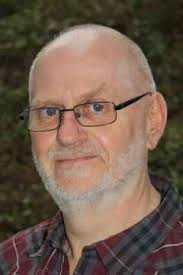
Klaus Lehnertz
Professor Lehnertz, PhD, is a Physicist and Director of the Neurophysics Group at the Department of Epileptology at Bonn University Medical Center. In addition, he is Co-Director of the Interdisciplinary Centre for Complex Systems and an affiliated member of the Helmholtz-Institute for Radiation and Nuclear Physics at Bonn University. He is Co-initiator of the International Seizure Prediction Group, which brings together researchers from a wide range of backgrounds including epileptology, neurosurgery, neurosciences, physics, mathematics, computer science, and engineering to deepen scientific and medical understanding of epilepsy and to develop new diagnosis, treatment and intervention options for patients with epilepsy. For more than two decades, his research group has been developing methods of data analysis and a theoretical framework to understand how brain sub-systems dynamically interact and coordinate functions under physiological and pathophysiological activities. His research interests include nonlinear dynamics, complex networks, statistical physics, neurophysics, computational physics, physics of imaging, medical physics, and epilepsy. He is the author of more than 200 original publications in international peer-reviewed journals, reviews, book chapters, and books.
.

Joseph Loscalzo
Dr. Loscalzo is the Samuel A. Levine Professor of Medicine and the Hersey Distinguished Professor of the Theory and Practice of Medicine at Harvard Medical School as well as Physician-in-Chief Emeritus and former Chair of the Department of Medicine at Brigham and Women’s Hospital. He is a summa cum laude graduate of the University of Pennsylvania, where he also obtained his M.D. and Ph.D. in biochemistry. He trained in internal medicine and cardiology at Brigham and Women’s Hospital, after which he was appointed to the hospital staff and Harvard Medical School faculty. After ten years on the Harvard faculty, Dr. Loscalzo moved to Boston University as Director of the Whitaker Cardiovascular Institute and Chief of Cardiology; in 1997, he was appointed Wade Professor and Chair of the Department of Medicine. In July, 2005, he returned to the Harvard faculty. Author of over 1,200 articles, 54 books, and 33 patents, he is internationally recognized for his work on the vascular biology of nitric oxide, redox biology, systems pathobiology, and network medicine, a field he helped establish. He has received many awards including election to the American Society for Clinical Investigation, the Association of American Physicians, the American Association for the Advancement of Science, National Academy of Medicine, the American Academy of Arts and Sciences, and the Académie Royale de Médecine de Belgique. He holds three honorary degrees. He is the recipient of a MERIT Award from the National Institutes of Health, the Research Achievement Award and a Merit Award from the American Heart Association, the Outstanding Investigator Prize from the International Society for Heart Research, the William Silen Lifetime Achievement Award in Mentoring from Harvard Medical School, and the International Pericle d’Oro Prize. He is a past member of the Advisory Council of the National Heart, Lung, and Blood Institute, and of the Council of Councils of the National Institutes of Health; has served on several NIH study sections and editorial boards, including the New England Journal of Medicine, and as Editor-in-Chief of Circulation; and is currently Editor-at-Large for the New England Journal of Medicine, a senior editor of Harrison’s Principles of Internal Medicine, and the lead editor of Network Medicine: Complex Systems in Human Disease and Therapeutics.
.
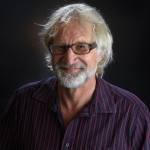
Alan Macy
Alan Macy is currently the Research and Development Director of Biopac Systems, Inc. In 1984, shortly after graduating MSEE from UCSB, Macy co-founded Biopac Systems. Biopac developed and manufactured novel, life-science oriented, hardware and software-based, data acquisition peripherals for the original Macintosh computer, and shortly thereafter, the first Microsoft Windows computers. Since then, Biopac has expanded worldwide and primarily serves the academic research and education community that focuses on human physiology and psychophysiology. Biopac data acquisition and analysis systems are used in nearly all Universities around the world. Biopac’s physiology data acquisition and analysis systems have been referenced and utilized in over 53,000 academic research publications and in over 7500 patents. Macy designs data collection and analysis systems, used by researchers in the life sciences, that help identify meaningful interpretations from signals produced by life processes. Macy orients to analog electronics, sensor design and digital signal processing. Trained in electrical and biomedical engineering and physiology, with over 40 years of product development experience, Macy is currently focusing on network physiology, psychophysiology, emotional and motivational state measures, magnetic resonance imaging-based sensors and augmented/virtual reality investigations. Macy presents in the areas of network physiology, affect and emotion. Macy’s talk “Beauty and the Origins of Electrophysiology, Telecommunications and the Global Theater” has been delivered at TEDx Hong Kong, Google, UCSB, Dalhousie and others. As an applied science artist, Macy focuses on technological extensions of the human nervous system and specializes in the creation of cybernated art, interactive sculpture and environments. Macy is a visiting scholar and research specialist at UCSB’s Psychological and Brain Sciences – Memory, Emotion, Thought, Awareness (META) Lab. Macy is also the founder of the Santa Barbara Center for Art, Science and Technology (SBCAST), a live-work arts residency in Santa Barbara, CA. This residence / laboratory provides infrastructure for emerging cooperative working models. SBCAST has relationships with the UCSB Media Arts and Technology Program, UCSB Neuroscience and UCSB Psychology to provide working development space and laboratory resources. Macy is also the founder of PIVOT, a Santa Barbara based incubation and development working studio for artists and scientists that’s presently in building development. Alan Macy website: www.alanmacy.com
.

Rosario Mantegna
Rosario N. Mantegna is professor of Applied Physics at Palermo University, Palermo, Italy and external faculty member of the Complexity Science Hub, Vienna, Austria. He was professor of Economics and Network Science at Central European University, Budapest, Hungary and honorary professor of Computer Science at University College London, London, UK. He is associated with the UCL Centre for Blockchain Technologies. His research concerns interdisciplinary applications of statistical physics. In 1995 he investigated the statistical properties of coding and non-coding regions of complete chromosomes and complete genomes with methods inspired by statistical physics, stochastic processes, and information theory. He is a leading expert in Lévy stable processes. He co-introduced the Truncated Lévy processes and devised the fastest algorithm known to simulate symmetrical Lévy processes. He was a pioneer in the field of econophysics. In 1991 he wrote the first econophysics paper and in 1999, he coauthored the first book on econophysics. The same year, he published the first paper on similarity-based networks proposing to use the minimum spanning tree as a filtering tool in multivariate complex systems. The methods of information filtering introduced by him and his collaborators are widely used by academicians and applied scientists in the analysis and modeling of complex systems. In 1999, he founded the Observatory of Complex Systems, a research group of Palermo University. In 2011, his team introduced the concept of statistically validated networks to highlight links of a projected network that aren’t compatible with a null hypothesis assuming heterogeneity of the elements. His recent interests of research concerns (a) statistical validation of hyperlinks, (b) co-morbidity networks, (c) higher order processes and structures in neuroscience, (d) investment decisions of single legal entities, and (e) underlying patterns of high frequency trading. Mantegna has participated in several national and international research projects contributing to the management and coordination of them. Examples are the COST P10 action “Physics of Risk”, the GIACS (General Integration of the Applications of Complexity in Science) coordination action of the EU, the CRISIs project of EU, and the INET project on systemic risk interlinkages. In 2008, within the GIACS coordination action, he promoted the “Jerusalem Declaration on Data Access, Use and Dissemination for Scientific Research”. Currently he is the PI of two national Italian research projects (i) PRIN 2022 PNRR project “Higher-order complex systems modeling for personalized medicine”, and (ii) PNRR MNESYS cascade project “Network science for neuroscience”.
.
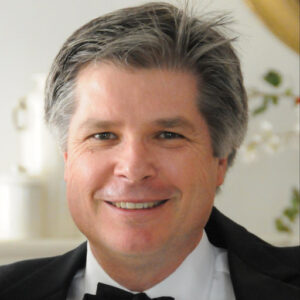
Randall Moorman
Randall Moorman, M.D., is Professor of Medicine, Physiology, and Biomedical Engineering at the University of Virginia where he is a clinical cardiologist and founding Director of the UVa Center for Advanced Medical Analytics. He completed his undergraduate and medical degrees at the University of Mississippi, did clinical training at Duke Hospital where he was Chief Medical Resident, and undertook basic science research training at Baylor in molecular electrophysiology and membrane biophysics. His research focuses on bedside prediction of subacute, potentially catastrophic illnesses using advanced mathematical and statistical pattern recognition analyses of time series data from clinical monitors. His work initially centered on neonatal sepsis, a life-threatening infection of the bloodstream, and now on adult patient deterioration in ICUs and hospital wards. He developed sample entropy for use in physiological time series, and he introduced coefficient of sample entropy for detection of atrial fibrillation. He is an inventor on 9 issued US patents, the 2014 UVa Innovator of the Year, and Chief Medical Officer of Advanced Medical Predictive Devices, Diagnostics, and Displays. He is vice-president of the Society for Complex Acute Illness and Editor-in-Chief of Physiological Measurement.
.
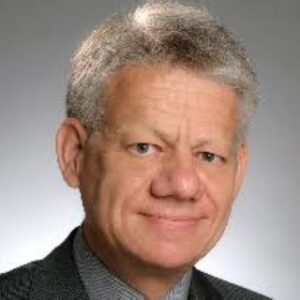
Ulrich Parlitz
Ulrich Parlitz is a research scientist at the Max Planck Institute for Dynamics and Self-Organization, Göttingen (Germany) and an adjunct professor of Physics at the University of Göttingen. He received his PhD in 1987 at the University of Göttingen. From 1989 to 1994 he was with the Institute for Applied Physics at the Technical University of Darmstadt, Germany, and in 1994 he became a scientific assistant at the Third Institute of Physics of the University of Göttingen where received his habilitation in 1997. His main research areas are nonlinear dynamics and data analysis with applications in life sciences, nonlinear oscillators, networks, cavitation, and laser dynamics. In 2010 Ulrich Parlitz joined the Research Group Biomedical Physics at the Max Planck Institute for Dynamics and Self-Organization. There he is involved in theoretical and experimental studies for understanding the nonlinear dynamics of the heart focusing on cardiac arrhythmias. This research includes numerical studies of (transient) spatio-temporal chaos in excitable media and the application of data assimilation methods for fusing experimental measurements (e.g., multichannel ECG time series) with mathematical models of electro-mechanical excitation waves in cardiac tissue. Ulrich Parlitz has published over 200 peer-review publications, including 13 papers in Physical Review Letters (Web of Science H-index 49). He served as a panel member of the German Science Foundation (DFG) for Statistical Physics, Soft Matter, Biological Physics and Nonlinear Dynamics, and in the Editorial Board of Phys. Rev. E. He is Speciality Chief Editor for Networks in the Cardiovascular System (Frontiers in Network Physiology), member of the Editorial Board of Frontiers in Applied Mathematics and Statistics (Dynamical Systems) and the Editorial Advisory Board of Chaos: Int. J. of Nonlinear Science, and member of the Advisory Committee of the conference series “Dynamics Days Europe”.
.
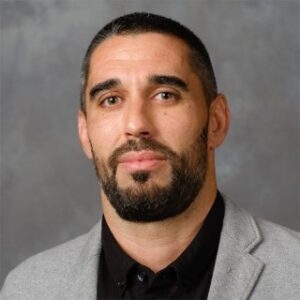
Sergi Garcia Retortillo
Dr. Sergi Garcia-Retortillo is an Assistant Professor in the Department of Health and Exercise Science at Wake Forest University (USA) and a member of the Complex Systems in Sport Research Group at the University of Barcelona (Spain). He holds a BS in Exercise Science from the University of Barcelona, a BS in Physical Therapy from University Ramon Llull, an MSc in Physical Activity and Health, and a Ph.D. in Exercise Science from the University of Barcelona. Dr. Garcia-Retortillo’s research focuses on the application of Network Physiology to Exercise Science. He explores how networks within and between skeletal muscles, as well as between muscles and other organs like the heart and lungs, function during exercise. His work aims to develop innovative fitness assessment systems using novel network-based markers. The primary markers in his research include: (i) inter- and intra-muscular coordination (muscle—muscle sEMG), (ii) cardio-muscular coordination (heart EKG—muscle sEMG), and (iii) cardio-respiratory coordination. These markers offer have the potential to open new horizons in exercise testing and rehabilitation by providing a comprehensive understanding of how the body, as a network, adapts to fatigue, training, and injury. Dr. Garcia-Retortillo has published over 30 scientific articles and book chapters and has received several awards, including recognition from the Southeast Chapter of the American College of Sports Medicine (SEACSM). In 2020, the American Physiological Association (APA) highlighted one of his works as one of the top published articles in physiological research. He has also served as an Associate Guest Editor for Frontiers in Network Physiology and holds positions on several editorial boards. With over a decade of experience in the fitness and wellness industry, Dr. Garcia-Retortillo has worked as both a strength and conditioning coach and a physical therapist, serving a diverse range of athletes and patients.
.
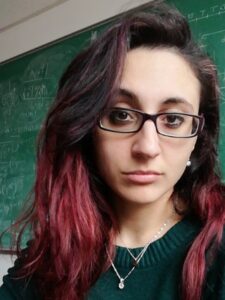
Rossella Rizzo
Rossella Rizzo is a mathematician and assistant professor in Applied Mathematics at the Department of Engineering, University of Palermo, Italy, awarding a grant on European Funds. She currently works on Turing instability and pattern formation for reaction-diffusion (RD) systems in brain dynamics. Her primary research goal is to study chemotactic RD systems to model multiple sclerosis lesions formation and understand under which conditions the system evolves towards coherent structures corresponding to the lesions visible in the brain magnetic resonance images (MRI). Dr Rizzo completed her PhD in Science and Engineering (specialization in Applied Mathematics) at University of Calabria, Cosenza, Italy, with excellent grades in 2020, working on the identification of brain structures to improve the knowledge of cerebral morphometry and the processing capacity of software for brain imaging. In 2018 Rossella joined Prof. Robert Whelan’s group at the Trinity Institute of Neuroscience (TCIN) as Visiting Researcher to conduct research on unhealthy ageing within the BrainPAD project. Between 2018 and 2020 Rossella worked, and since then collaborates with Prof. Plamen Ivanov’s group at the Keck Laboratory for Network Physiology at Boston University, applying cross-correlation functions and statistical analysis to understand dynamical interactions between the brain and the locomotor system during different sleep stages in healthy and Parkinson’s subjects. Between 2020 and 2021 Dr Rizzo worked as a Postdoctoral Research Fellow in the FRAILMatics Research Group, under the direction of Prof. Roman Romero-Ortuno, at The Irish Longitudinal Study on Ageing (TILDA). There, she worked on cognitive data for older people, applying big data analysis, computational modeling and machine learning techniques to identify in a large population-based study participants who are at high risk of mobility and cognitive decline and consequential loss of independence. Dr Rizzo contributed to various conferences with talks, posters, and abstracts, organized conferences and summer schools, has received international awards, and has published on different high impact factor peer-reviewed journals. She is review editor in Frontiers in Network Physiology and Frontiers in Fractal Physiology, and referee for Physiological Measurements, Scientific Report and Physics in Medicine.
.
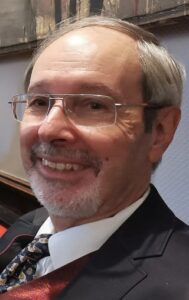
Eckehard Schöll
Is Professor of Theoretical Physics at TU Berlin (Berlin Institute of Technology), Guest Scientist at the Potsdam Institute for Climate Impact Research, and Principal Investigator of the Bernstein Center for Computational Neuro-
science Berlin. He studied physics at the University of Tübingen (Germany), and holds PhD degrees in mathematics from the University of Southampton (UK, 1978) and in physics from RWTH Aachen (Germany, 1981), and an Honorary Doctorate from Saratov State University (Russia, 2017). In 2018 he received the Badge of Honor from the German Physical Society (DPG). He held a Visiting Professorship of the London Mathematical Society, and a Fulbright Senior Scholar Award at Duke University, USA. He is President of the International Physics and Control Society (IPACS), a member of the German Physical Society (DPG), and a member of the Italian Society for Chaos and Complexity (SICC). He is Speciality Chief Editor of the new open access Journal Frontiers in Network Physiology: Networks of Dynamical Systems, which was launched on April 1, 2021. He has authored more than 570 publications in peer-reviewed journals (Hirsch index h=71, google scholar) and 3 books, and is editor of 5 books (among these the Handbook of Chaos Control) and 10 topical journal issues, among which the latest is the Research Topic “Adaptive Networks in Functional Modeling of Physiological Systems” in Frontiers in Network Physiology. Since 2005 he has been a Member of the International Advisory Board of Dynamics Days Europe, which he chaired 2016-18, and the Organizer of International Conferences on Control of Complex Systems and Networks Usedom 2016, Warnemünde 2014; Toronto 2015, Palma de Mallorca 2012, and the Local Chairman of the 72nd, 76th, and 79th Annual Meeting and Spring Meeting of the Condensed Matter Division of DPG, Berlin 2008, 2012, and 2015, and of the Joint meeting of the DPG and EPS Condensed Matter Divisions, Berlin 2018. He was Deputy Chairman and Principal Investigator of the Collaborative Research Centers on Semiconductor Nanostructures (SFB 296, 1994-2002), on Complex Nonlinear Processes (SFB 555, 1998-2010), and Founder and Chairman of SFB 910 on Control of Self-Organizing Nonlinear Systems (2011-2018). Eckehard Scholl is an expert in the field of nonlinear dynamical systems and head of the group Nonlinear Dynamics and Control. His work pertains to a wide area of research in the fields of mathematics and physics, particularly semiconductor physics, laser physics, neurodynamics, complex systems and networks, synchronization, time-delayed feedback control, and bifurcation theory. His latest research is also related to topics in biology and the social sciences, e.g. simulation of the dynamics in socioeconomic, physiological, or neuronal networks and power grids. He is one of the forerunners into the research of chimera states.
.
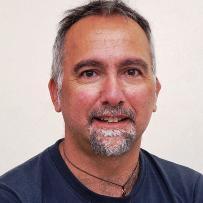
Sebastiano Stramaglia
Dr. Stramaglia is a Professor of Applied Physics at the University of Bari, Italy, and External Scientific Member of the Basque Center for Applied Mathematics, Bilbao, Spain. He received his Ph.D. in Statistical Mechanics of random surfaces from the University of Bari in 1995, and the Laurea degree in models of strongly correlated electronic systems in 1991. Since 2001 he is a member of the Center of Excellence “Innovative Technologies for Signal Detection and Processing”, funded by the Italian Ministry for Scientific Research, since 2002 he is a member of the V National Scientific Commission of INFN-Istituto Nazionale di Fisica Nucleare, Italy. He chaired several international events, including “Modeling Migraine: from nonlinear dynamics to clinical neurology” July 2009, Berlin, and “Nonlinear dynamics in electronic systems” July 2013, Bari. Editor of the books “Modelling Biomedical Signals”, World Scientific 2002, and “Emergent Complexity from Nonlinearity, in Physics, Engineering and the Life Sciences”, Springer 2017. He has been visiting scientist at the Institute for Theoretical Physics NORDITA and at the Department of Data Analysis of the University of Gent, Belgium, and visiting professor at Biocruces Health Institute, Bilbao, Spain. Since 2003 he is team leader of the INFN project “Biological applications of Theoretical Physics Methods”. His research focuses on dynamical networks and Granger causality approaches to physiological interactions, in particular he developed a kernel approach for the inference of nonlinear coupling among dynamical systems with applications to brain function and brain-heart interactions.
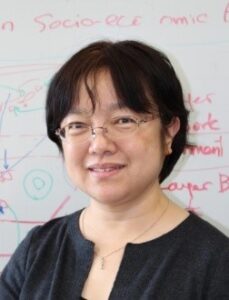
Misako Takayasu
Misako Takayasu is a professor in the School of Computing at the Institute of Science Tokyo (formerly Tokyo Institute of Technology) in Japan. She is also a member of the Science Council of Japan. Trained in theoretical physics at Nagoya University, she received her Ph.D. in non-equilibrium statistical physics from Kobe University. She has studied various statistical properties such as dynamical phase transition behavior in wide areas of complex systems in the real world through data analysis and numerical simulations, including automobile traffic, information packet traffic in the Internet, financial Brownian motions, business firms’ trade relationship networks, rumor diffusion in cyberspace, and human mobility based on mobile phone GPS data. As well as publishing scientific papers and books, her mathematical model for estimating money flows in the transaction network of about 1 million firms has been used in the RESAS (Regional Economy Society Analyzing System) platform provided by the Cabinet Office of Japan. She is a member of the International Advisory Committee of the StatPhys conference and on the editorial boards of scientific journals such as Scientific Reports, Entropy, Complexity and Physica A. Since 2022, she has been involved in a scientific grant project supported by the Japan Science and Technology Agency, “Decoding the host-gut microbiota crosstalk by developing an automated sample collection platform for use in high-resolution time series analysis”. It is known that there are about 10 to the 11th power microbiomes in just one gram of feces, and these microbiomes control the health status of the host. She is developing new data analysis methods for metagenomic time series and building numerical models to elucidate microbiome interaction networks.
.

Peter A. Tass
Peter A. Tass studied medicine (MD, Ulm and Heidelberg Univ., Germany), physics (PhD, Stuttgart Univ., Germany), and mathematics (diploma, Stuttgart Univ.) and made a Habilitation in physiology (RWTH Aachen University, Germany). Since 2017 he is Professor of Neurosurgery in the Department of Neurosurgery, Stanford University Medical School, Stanford, CA, USA. Peter A. Tass investigates and develops neuromodulation techniques for understanding and treating neurologic conditions such as Parkinson’s disease, epilepsy, dysfunction following stroke and tinnitus. He creates invasive and non-invasive therapeutic procedures by means of comprehensive computational neuroscience studies and advanced data analysis techniques. He has pioneered a stimulation approach which aims at inducing long-lasting desynchronization by stimulus-induced unlearning of abnormal synaptic connectivity. Peter A. Tass has published more than 170 peer-reviewed papers, is inventor or co-inventor on more than 270 patents and received a number of national and international awards. Stanford lab homepage: http://med.stanford.edu/tass-lab.html
.
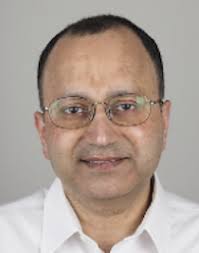
Robert J. Thomas
Robert Joseph Thomas, M.D., M.M.Sc, is Associate Professor of Medicine, Harvard Medical School & The Division of Pulmonary, Critical Care & Sleep, Beth Israel Deaconess Medical Center, Boston, Massachusetts, USA, His background includes Internal Medicine, Neurology and Sleep Medicine. His research spans mood, cognition (translational and epidemiology), sleep epidemiology, signal analysis in sleep medicine, and sleep-breathing outcomes, and functional imaging of cognition in sleep disorders. He has articulated a new approach to sleep physiology termed “sleep effectiveness”, which is a cross-physiology, networked, integrative approach to characterizing sleep state using cardiopulmonary coupling estimates (patented). His laboratory generates novel approaches and analysis tools for probing several sleep signals – ECG, EEG, respiration and multi-signal integration approaches. He funding sources are the NHLBI, NINDS and the American Sleep Medicine Foundation. He was key in the development of a FDA approved wearable device, the M1/Sleeplmage system, for dynamic sleep quality tracking. He is an acknowledged expert in the area of treatment of central and complex sleep apnea and periodic breathing, utilizing CO2 regulation approaches (patented). He studies brain health in the context of sleep disorders in the USA and South Korea. He directs the AASM accredited clinical sleep center and sieep laboratory, and the sleep medicine training program at the Beth Israel Deaconess Medical Center. I worked in the development and implementation (patented) of auto CPAP algorithms from concept through regulatory submission, which are now in FDA approved products.
.
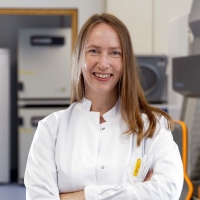
Bettina Weigelin
Bettina Weigelin holds a professorship in Preclinical Imaging of the Immune System at the Werner Siemens Imaging Center, Department of Preclinical Imaging and Radiopharmacy at the University of Tübingen, Germany. Her research group ‘Multiscale Immunoimaging’ combines advanced microscopic techniques with macroscopic PET/MR imaging to gain mechanistic insights into the immune system in inflammation and cancer. Her work focuses on visualizing immune cell function across scales, from cellular mechanisms to systemic effects, with the goal of identifying strategies for improved immunotherapies. Dr. Weigelin received her diploma in biology from the Julius-Maximilians-University of Würzburg, Germany, in 2007 and her Ph.D. in medical sciences from Radboud University Nijmegen, the Netherlands, in 2015. In her PhD research she applied intravital multiphoton imaging to study cancer invasion and immune function in solid tumors. Supported by an NWO Rubicon Young Investigator Award in 2016, she conducted postdoctoral research at MD Anderson Cancer Center, Houston, TX, USA, where she developed strategies to target prostate cancer metastases in bone, a critical clinical challenge. In 2019, she accepted a Junior Research Group position at the Werner Siemens Imaging Center at the University of Tübingen, Germany and in 2021 received a professorship at the University of Tübingen. Her research record includes several pioneering contributions to science, including the discovery of additive cytotoxicity by cytotoxic T cells, the implementation of third harmonic generation microscopy to understand tissue-guided cancer invasion, and novel insights into the immune-enhancing effects of hyperthermia. In recognition of her research, Dr. Weigelin has received several awards, including the 2024 DGHT Society Award, the 2021 Best Publication Award in Cancer Research from Radboud University, and the 2017 Young Investigator Award from the Society for Thermal Medicine. She also serves on the editorial board of the Journal of Molecular Imaging and Biology and holds leadership roles in international societies, including board member of the European Society for Molecular Imaging (ESMI) and advisory board member of the German Bioimaging Society (GerBi). Her commitment to diversity and mentorship is reflected in her leadership roles, including her role on the Executive Committee of the iFIT Cluster of Excellence as Coordinator for Diversity and Equal Opportunity. Beyond academia, Dr. Weigelin is actively involved in science communication, organizing outreach events and lectures for Kids University and Science and Innovation Days to inspire the next generation of scientists.
.
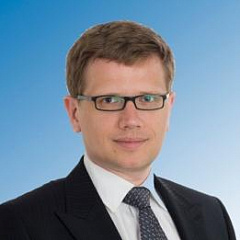
Alexey Zaikin
Alexey Zaikin has a Chair in Applied Mathematics and Systems Medicine at University College London, holding a shared appointment between Department of Mathematics and Institute for Women’s Health. Currently funded by MRC and CR-UK, he has published more than 140 papers in multidisciplinary areas, especially in the field of complex systems and data analysis, and has long experience of collaboration with wet biologists and clinicians. He studied physics at Moscow State University, and received an MS in Physics with distinction and the Khoklov Award for Excellence in Research. He got his PhD in 1998 in Moscow and Habilitation in 2003 in Potsdam, Germany. In 2008 he joined UCL and worked on analysis of clinical data, to find new oncomarkers for ovarian cancer, to investigate new methods for the analysis of DNA methylation, to study association of sex-steroid hormones with breast cancer risk, to investigate sex-hormone system in BRCA1/2 mutation carriers, to study early detection of colorectal and pancreatic cancer or aberrant regulation of RANKL/OPG in developing breast cancer. In addition to data analysis, he devoted a significant amount of time to the development of new statistical and Al methodologies, including development of algorithms for the detection of network community oncomarkers, parameter estimation methods, Bayesian change point methods for the analysis of longitudinal oncomarkers, or new methods to analyse trends in longitudinal oncomarkers. These works confirmed the power of longitudinal algorithms over the analysis of single time points. Recently he started to utilize parenclitic and developed synolitic network analysis methodology. For the past 5 years, his research interests have included the study of intelligence and consciousness in genetic and neuronastrocyte networks, investigating the role of astrocytes and a generation of Integrated Information.
.

Xiyun Zhang
Dr Zhang is Associate Professor at the Department of Physics, Jinan University, Guangzhou, China. Dr. Zhang received his PhD in theoretical physics at East China Normal University in June 2016. He was a W.M. Keck Foundation post-doctoral fellow at the Keck Laboratory for Network Physiology, Boston University from 2016 till 2019. In December 2019 he joined Jinan University, Guangzhou China. Dr. Zhang’s main research interest is to understand complex phenomena and collective behaviors in physical, physiological and biological systems utilizing methods and concepts from nonlinear dynamics and statistical physics. His research focuses on synchronization in complex networks of dynamical systems; novel time series analysis methodology to infer network interactions among physiological systems; developing novel network-based biomarkers of organ interactions for early diagnosis and prognosis; uncovering regulatory mechanisms underlying distinct physiological states and functions at the organism level through the Network Physiology framework.
.
.
.


